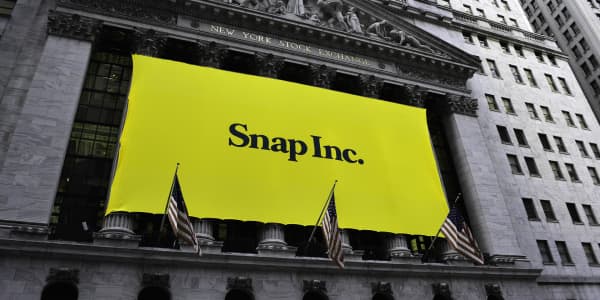A fast-growing internet startup with a "visionary" founder goes public and offers negligible rights to the shareholders buying billions of dollars worth of stock. We've seen this movie before.
There are many comparisons to be made between Facebook and Snap Inc., the parent company of Snapchat. A key one for investors: the tradeoffs in buying shares of a new technology company without having a say in how it's run.
Snap is offering 200 million shares in its initial public offering, all of them non-voting. It is the first time a company has attempted to go public with non-voting stock, although Facebook and Google both subsequently issued non-voting shares.
In effect, the non-voting shares are similar to the dual-class share structures that are more common among tech IPOs. Dual-class structures are designed to make it difficult or impossible for non-founder shareholders to generate a majority vote, which is needed to make certain changes at the company, such as replacing the CEO. Non-voting shares go one step farther — investors simply do not get a vote.
But how much does corporate governance truly impact the performance at a company? The results are mixed and often reliant upon the person who is wielding control.
Every founder, including Evan Spiegel of Snapchat, wants investors to think they are the next Mark Zuckerberg and therefore deserve more control. Investors who bought stock in Facebook five years ago would have more than tripled their investment today. Same with Google — which went public with multiple classes of shares in 2004 and has given investors returns of nearly 2000 percent since then. (Neither Google founder was chief executive at the time of its IPO, but they were both heavily involved.)
Founder-led Tech IPOs with Multiple Share Classes
| Year | Company | Stock appreciation (or depreciation) since IPO |
|---|---|---|
| 2004 | Google (now Alphabet) | +1,904% |
| 2011 | Zynga | -73% |
| 2011 | Groupon | -76% |
| 2011 | LinkedIn (MSFT acquisition price) | +335% |
| 2012 | +252% | |
| 2014 | GoPro | -61% |
| 2015 | Fitbit | -70% |
| 2015 | Box | +30% |
Source: Source: Yahoo Finance
But there are certainly red flags. Zynga, Groupon and GoPro offered multiple classes of shares to their investors and are each down at least 60 percent from their IPOs. That said, several tech companies that have gone public with a single class of shares have also suffered. Twitter is trading about 37 percent below its 2013 IPO price, while Etsy is down 19 percent since its IPO in 2015.
Many studies tend to favor the single class of stock regardless. Controlled companies — or those that give certain insiders more power than others — tend to underperform non-controlled companies over time, according to a 2016 study by the Investor Responsibility Research Center Institute and Institutional Shareholder Services.
In other words, the returns of Facebook and Google may be exceptions rather than the rule when it comes to dual-class shares.
More like Facebook or Zynga?
Investors are trying to discern whether Snap falls into the Facebook bucket -- or the one with Zynga.
Some investors are worried that Snap could be starting a dangerous precedent with its non-voting shares. The Council of Institutional Investors wrote a letter Feb. 3 to Mr. Spiegel, the founder, his co-founder Robert Murphy and Michael Lynton, the Chairman.
"We strongly urge Snap to reconsider the proposed structure, and instead go to market with a single-class voting structure, which overall is associated with stronger long-term performance and mechanism for accountability to owners," said Kenneth A. Bartsch, the executive director for CII.
Other investors, though, are bullish on the prospects for Snap and do not care about voting rights.
"I know this is a contrarian view, but I fully support the Snap founders having complete control," said Jeremy Abelson, a portfolio manager with Irving Investors. "There's no reason for them to go through the dance of allocating different voting classes; they want control, they deserve control and they have proven they can execute with control."
A representative for Snap declined to comment on its governance structure, due to the company's quiet period restricting public commentary ahead of the IPO.





